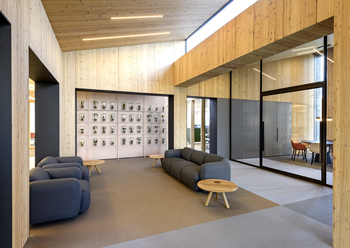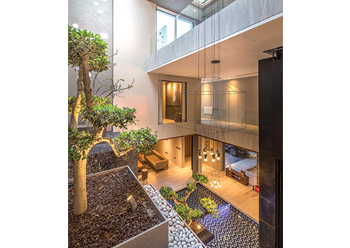Vibia complements biophilic design
With the global trend towards well-being, biophilic design has been gaining renewed interest, says a Spanish lighting systems provider, which details some of the key projects where its solutions have been used to enhance the ambiance.
01 June 2020
Vibia, which makes contemporary designer lighting systems that bring technological innovation and cultural expression together, says its mission is to provide enhanced spaces for better living, offering many collections that capture biophilic concepts.
“From LEED (Leadership in Energy and Environmental Design) buildings and sustainable materials to eco-friendly décor, design today is increasingly oriented to the environment. But the idea is not a new one: For decades designers have been inspired by ‘biophilia’, a Greek term that means ‘the love of living things’,” says a spokesman for the Spanish firm.
“Biophilic design is based on the concept that humans have an inherent affinity for nature, therefore, their living environment should more closely connect to it for enhanced health, well-being, and productivity,” he adds.
An important element of biophilic design is lighting, the spokesman says, specifically organic designs and materials, as well as systems that provide brightness through the day to mimic the natural pattern of the sun and support circadian rhythms.
 |
|
Wireflow pendants ... also installed for an office renovation in The Netherlands. |
Among the many residential and hospitality projects where Vibia’s systems have been installed is a villa in Bahrain. Set on the island’s sandy shores, the villa brings the outside in with a triple-height atrium. The sun flows through skylights, brightening stone-clad walls and bonsai trees, the spokesman says.
Suspended overhead are a pair of Wireflow pendants, which are artist and industrial designer Arik Levy’s contemporary interpretation of the classic chandelier. The fixtures’ lean, black cables trace an airy outline that fills the space, yet allows the soaring ceilings and striking architecture to take centre stage.
Wireflow is a hanging lamp which reviews and updates the chandelier look through an exercise of simplification that explores its essence and enhances its outline with great delicacy and, at the same time, a strong formal presence. Its appearance, as a structure of fine cables finished with LED terminals, discretely connects with classic chandelier models, taking this type of lamp to a new, ground-breaking and futuristic dimension. Employing CREA product configurator software, the design can be modified to adapt to specific project requirements.
Other Vibia systems can be found in prominent projects around the world. Levy’s North floor lamp illuminates the Mirror Bar in the iconic Radisson Blu Carlton Hotel in Bratislava, Slovakia.
“In the bar’s seating area, North’s arms branch upwards, the plant-like look echoing the botanical theme set by the forest-green colour scheme and sprawling tree dominating the centre of the room,” the spokesman explains.
For an office renovation in Wijk en Aalburg, The Netherlands, Dutch design studio VEVS aimed to integrate the indoors with the outside. “The firm, DTI, produces butter and puff pastry, so VEVS looked to the Dutch countryside dotted with agrarian barns for inspiration. They installed floor-to-ceiling windows, wood beams, and furniture in organic forms.
“In the conference rooms, the designers installed Levy’s Wireflow pendants. The industrial black cables create a delicate three-dimensional design that’s at once graphic and transparent and a striking material contrast with the organic wood table and panelling,” the spokesman explains.
In Barcelona’s Gates Hotel, natural materials like marble, brass, and walnut lend a rich, earthy ambiance. At one end of the loft-like lobby, the designers installed Antoni Arola’s Palma, which connects light and vegetation in a pendant that appears to float in mid-air.
Blown-glass globes coupled with lush, cascading greenery recall an ancient hanging garden. Positioned near an oversized potted palm, it creates an interior landscape that nods to nature and enhances the hotel’s organic, relaxed sensibility.
 |
|
Palma horizontal pendants brightens the Petit Epicerie in Liege, Belgium. |
Vibia’s Palma is offered as wall, hanging and table lamps.
Palma in both horizontal and vertical styles also illuminates Valencia’s Vaqueta Gastro Mercat restaurant, tucked in the back room of a greengrocer. Surrounded by undulating bamboo canes and brimming with vegetation, the pendant is positioned in several areas, creating the feeling of dining in nature.
Palma takes pride of place in Bolpetta restaurant in Turin, Italy. “The slightly flattened globe silhouette recalls the shape of the Earth, an organic design that complements the wallpaper’s graphic pattern and colour scheme.
“The plants spill over the sides, lending an informal attitude to the space and providing a warm glow of illumination,” he says.
In an apartment in Alicante, Spain, the Palma horizontal pendant brightens the dining room. The space has a natural feel, with pale woods and botanical wallpaper. A trio of globes interspersed with greenery fits perfectly in this setting, its horizontal profile spanning the length of table below, he says.
Petit Epicerie, an indoor-outdoor restaurant in Liege, Belgium, also features Palma. In the airy dining room, vegetation in the horizontal pendant brings out the colour of the green-grey walls. A horizontal swath of Palma orbs draws the eye over the bar area, its black metal canopy echoing the ebony hue of the glossy tile.
Founded in 1987 in Barcelona and with a presence in more than 80 countries around the world, Vibia also has an associate in the US. Its products provide specific solutions and also inspire the creative capacity of architectural, interior design and lighting professionals with a catalogue filled with unique lamps.



